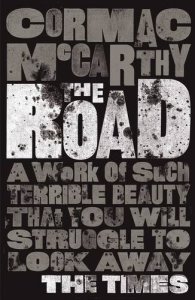Some Ideas Hinted At
 McCarthy, Cormac (2006). The Road. New York: Knopf (306 pp).
McCarthy, Cormac (2006). The Road. New York: Knopf (306 pp).
The planet has been stricken by something like nuclear winter. The skies are perpetually dark and the sun is not visible. Black soot falls from the skies continuously. Somehow, the hydrologic cycle remains intact anyway, since it rains a lot. Most animal life has perished, save a few marauding bands of humans and, unaccountably, one dog. Plant life is all dead, although “grass” is often mentioned and apples fallen from trees have miraculously not rotted. No mention is made of insects, which could probably survive anything, and microorganisms have made it through unscathed (viruses, bacteria, and catabolic organisms). Whatever happened, years or decades ago, a man and his son of about 10 years, pushing a grocery basket, walk the abandoned state highways in the U.S., scavenging. They find just enough food to survive, just enough clothing to keep from freezing, and just enough water. They avoid being eaten by groups of savage cannibals who try to get them. Where they came from or what they’ve been doing for the past few years is unknown, so we must simply accept the stage as it is set, as we do in Waiting for Godot.
Most of the book is narrative description of the rain, the cold, darkness, hunger, fear, danger. The duo investigates numerous abandoned farmhouses, suburban houses, stores, gas stations, a train and a boat, always searching for food but everything has been extremely picked over already. Part of the fun of the novel is how the father always seems to find something that so many others have overlooked, such as a few ounces of motor oil that can be used for starting fires. The story is extremely repetitive. Find house or store. Search it for goods. Search for a campsite before dark. Hide the basket. Hide from bad guys. Get rained on. Try to stay warm.
A small percentage of the book is dialog, mainly between the man and the boy. It is sparse and extremely repetitive. The boy declares he is scared. The father says, I know – it will be fine. The boy says okay. There is a certain Beckett-esque rhythm to the dialog that is noteworthy, but that is unfair to Beckett. This dialog is extremely banal.
Another small percentage of the word count is the man’s reminiscences. Some of these are the best parts, such as when he tells the story, or at least alludes to the story, of what happened to his wife, who couldn’t face the future and killed herself. This brief passage is the core of the book, because what it’s really about is how you face a future that is no future. Do you take your life? Do you abandon your humanity and become a cannibal to survive? How would a person be if the future were utterly without hope?
The omnipresence of the wire shopping cart evokes the hopelessness of homeless people we see in our cities. How do they face a future that is no future? The abundance of intact though ransacked buildings is also an interesting element of the story. Does it say that our built environment gives us a false impression that the future extends forever? It’s important to the boy that he and his father be counted among the “good guys,” apparently because they are not cannibals, and because they “carry the flame” (whatever that means). This raises important questions about morality in a world without civilization. “Good guy” in relation to what? Is cannibalism not a rational response to the circumstances? Unfortunately, none of these interesting themes is explored. Instead, we get scene after scene of highly repetitive (some almost verbatim), material describing a stark, but not-believable world, with shallow characters who never change. The book is a missed opportunity, despite its Pulitzer Prize.
